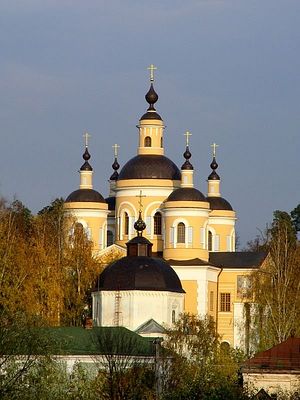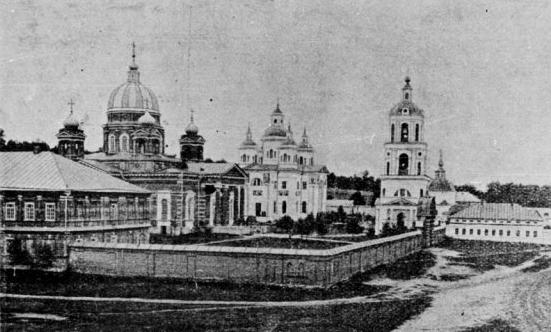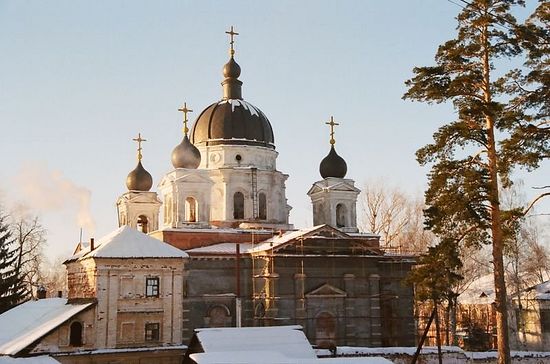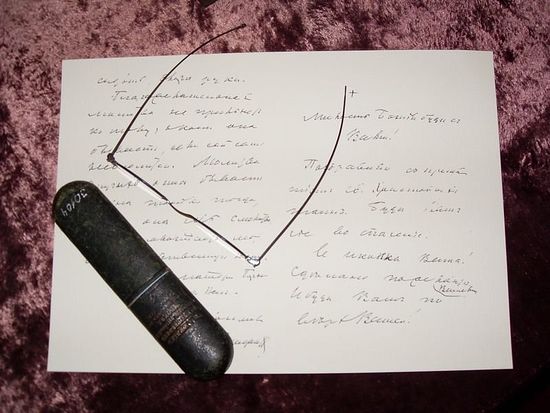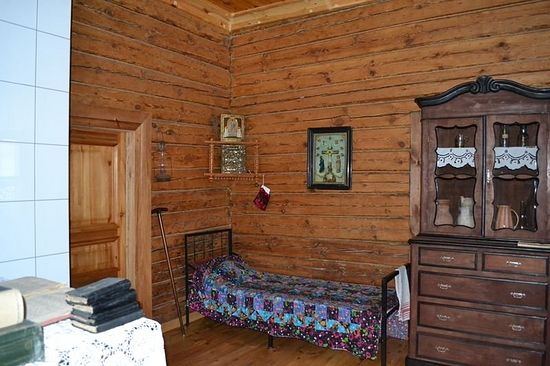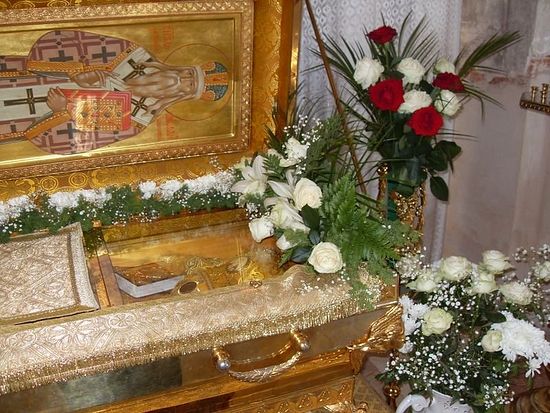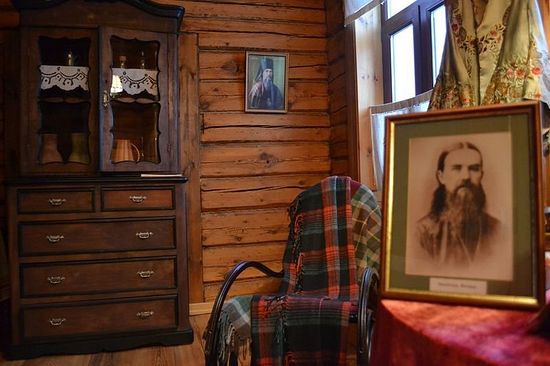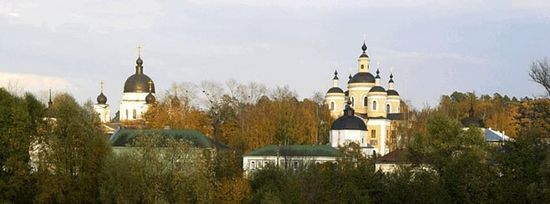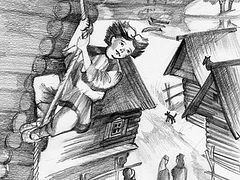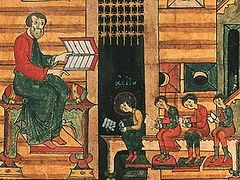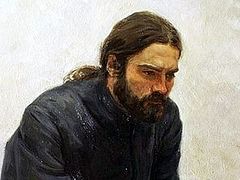I
Vladyka Theophan got up earlier than usual that day, read morning prayers and the prayers before the Holy Communion. Unhurriedly, with notable reverence, he celebrated the Divine Liturgy in his cell church and received Holy Communion. His austere meal were the Holy Gifts and a swallow of water. Then he sat down at the table to look through the papers, giving close attention to the letters, just to make sure he had responded to all of them. He proceeded to the bedroom, lit two candles from a perpetual lamp and immediately placed them in a candle holder. Vladyka prostrated himself before an icon of Christ and murmured quietly, “O Lord, Jesus Christ, I place my soul in Thy hands”. He lay down on his little bed covered by a piece of white cloth; and with his hands crossed over the chest, he sighed deeply and closed his eyes. Fr. Evlampy, his cell attendant, would later find him lying in this position. A mournful peal of the monastery bell brought the tragic news to the brethren of the Vysha Hermitage. Visited only by the monastery’s abbot Archimandrite Arkady, the father-confessor Fr. Tikhon, and the monk Evlampy, the cell was for the first time in twenty years thronged with people wearing black monastic vestments. From this cell, concealing his human nature in a recluse, a true pastor of all Russia, Vladyka Theophan emanated the light of Divine love and wisdom.
I believe that is how it happened. On 6 January 1894, ended the earthly path of St. Theophan, Bishop of Tambov and Shatsk, named after the feast of the Theophany that was celebrated on that very day. Only the omnipotent Lord witnessed his peaceful, righteous repose.
***
In midsummer, I finally made up my mind to travel to the place of the repose of St. Theophan—it had appealed to me for several years already. Having finished all my urgent work and put off all possible tasks, I fixed the date and found the courage to set out to the Holy Dormition Vysha Hermitage. Nevertheless, something went wrong from the very beginning. The bustle of routine life would hold me back, and I managed to leave Moscow only by 11 o’clock in the morning. And then, as usual, stuck in traffic jams I was forced to drive leisurely in the flow of cars along the Moscow Ring Road and other highways. “Where are they all going so hurriedly today?” The sun shone right in my eyes—both my sunglasses and the windshield were of no use. The time flew by while the traffic crawled along. “And these permanent road repairs... Why do Russian roads start to cave in while they are still being built?” At that moment I recalled the words of the Russian poet Alexander Pushkin, which are well-known to any car driver, “In about five hundred years for sure our byways will blossom into splendid highways.” “Five hundred years from Pushkin’s time... what a long time to wait!” I sigh. But if there are roads, there will be Russia, and Russia is inseparable from the saints, from the Orthodox faith.” This thought immediately cheered me up so that I headed for the holy place with even more determination. Meanwhile, the car was gradually approaching the town of Bronnitsy.
II
Unnoticeable in everyone’s life, the Providence of God guided George Govorov along the way of Christian virtue since his childhood. The great fruit in the field of God was planted in the family, where his upbringing began. From his father, who was a priest, St. Theophan inherited an agile mind, zeal for learning and a talent for persuasion; the gift from his mother—a priest’s daughter—were a loving heart, a sensitive nature, and a peaceful, generous disposition. Both parents granted their son deep and passionate faith, love for the Church and prayer. Finally, the education and knowledge Vladyka received at Liven Theological College, and the Tambov and Kiev seminaries developed his God-given talents.
These talents and aptitudes—do they have any worth without proper attention and patient cultivation? Aren’t we familiar with cases when a talented, abundantly gifted child would grow into a truly mediocre, unlucky fellow, rather inferior to his peers? The Gospel parable of the talents, based on a common example from our day-to-day life, undoubtedly speaks about something different—about talents of mind, morality and spirit. Georgy Govorov managed to inherit all of them: positive interests, wise upbringing, and a decent education.
As is characteristic of people of high moral standards, he never ceased to learn and make progress. During a short human life, he tried to fully enrich his mind and soul, and bring good fruits of his life to God. The best student at school and seminary, he thoroughly performed any task or work he was entrusted with. Still a young man, he manifested love for solitude, prayer, and reflecting on the Holy Scripture and works of the Holy Fathers, which obviously exuded hope that the main work of his life would be successful and outstanding. But on the way to reclusion, he was destined to make a significant contribution for the sake of strengthening his much beloved Church.
***
Bronnitsy—an ancient Russian town in the Moscow region, two hundred years younger than Moscow—was amazingly dainty and clean. My way through the town seemed light and fine, with a gentle pace interrupted by rare traffic lights and crosswalks (pedestrians walking across them were obviously used to polite drivers). It gave me a chance to see each detail of quaint architecture in the town’s center, houses with front yards in the outskirts, and churches. To my joy and surprise, a number of them were old, restored, or new.
And there appeared to be another reason for joy: one of the churches was familiar to me. In the Soviet period of stagnation, the church was used as a building materials store. My colleagues and I had visited the store on the way to our company’s branch office located in the Moscow region. I remember being amazed: I thought, why is the ceiling so high in this large, but so ordinary store? On the ceiling, by the way, as well as the walls, patches of partly saved frescoes could be seen under the ragged plaster.
“This was a church”, someone said in a whisper. In those years we were strongly discouraged from attending church. I felt embarrassed; although I had grown and studied in an atmosphere of atheism, I had always revered everything connected with the Church and the Divinity. I believe I inherited it from my very kind mother. We had no icons at home and I’ve never seen anyone pray in our family, but once a year, in spring, my mother baked marvelously delicious kulichi (Russian paschal bread). Despite all my begging, she would never bake them in any other time of the year. She said, “We’ll bake kulichi again next year.” How happy she was to see me, a grown-up man, make the sign of cross by myself. May the Lord give rest to her soul.
Thank God, we didn’t buy anything at that store.
My trip got much nicer once I passed Bronnitsy—there were fewer cars, the traffic wasn’t so heavy, and as I approached Kolomna the road turned into a broad, luxurious highway that was a real pleasure to drive on. Pushkin’s words came into my mind again. Full of hope, I thought: Maybe, the poet wasn’t quite right, it’s not five hundreds years that we’ll have to await our good roads, but at least two hundred?
I quickly passed Kolomna by a roundabout road, leaving the town somewhere lower in the right. In the dim light houses, various buildings and a glow on the church domes appeared. Then I caught a fleeting glimpse of centuries-old Bobrenev Nativity Monastery, which could be seen in the light among the trees.
Then the ancient, well-known towns of Lukhovitsi, Larino, and Gavrilovskoye were left behind.
An hour later I reached Ryazan. I went towards a bypass, but a real disappointment awaited me there. A very poor roadway followed the perfect highway: it was narrow, bumpy, and covered with mud that appeared there from nowhere. Then, thanks to other cars, that mud splashed on my own car; and to be honest, I splashed the cars with mud too. My spirits sank. To make it worse, we slowed down and the languid flow of cars repeatedly got stuck in traffic jams. A wave of despondency embraced me. Obtrusive thoughts were hitting my mind: “I’ll never get to the hermitage. It’s so late now, and there’s still a long way to go. Maybe it’s better to go back and come next time?” I shook my head, trying to get rid of the gloomy thoughts that were very much like a swarm of gnats. “A little more effort, a bit more patience and I’ll be on a highway again.” Suddenly a sign appeared: Shatsk, 150. That was my way to go.
III
The future saint was still George Govorov. On his path to becoming the Vysha recluse there were a many steps to climb and myriads of tasks to undertake. He had a dream, and entrusted its fulfillment to the Lord. God guided him to his desired goal through the way where he was to acquire vast knowledge and considerable experience, so that the primary duty of his life would bring good and abundant fruit, but not turn into an ephemeral illusion.
Shortly before graduating from seminary, George received the monastic tonsure and was named Theophan (God made manifest). Indeed, he was one of those God-pleasers through whom the Lord worked His miracles. There was a lot of work for St. Theophan to do by the way, and its diversity is truly amazing. Without any chance to slow down, his life broke into a full gallop bringing him to one place after another, and from one work to another: rector of the Kiev church school, professor and the Assistant Inspector at Novgorod Seminary and the Petersburg Academy, and then he was assigned as a member of the Russian Mission in Jerusalem. Later on he returned to Saint Petersburg and was assigned as rector of Olonets Seminary, then moved to Constantinople stirred up by the unrest caused by the Greeks and the Bulgars. And then he was recalled to St. Petersburg to become the Academy’s rector. Finally, Vladyka Theophan was consecrated as Bishop of Tambov, and later transferred to Vladimir. That was how he explored the world he was destined to transform by his light and mercy. St. Theophan used to compare his life to a ball that is hit and then bounces back and forth. He consigned this bouncing completely to God...
It’s truly astounding how successful his works were in all periods of life. The key to success is obvious, it was revealed to us long before St. Theophan by the Holy Fathers, preceded by the Holy Disciples and the Lord. “God is love”, claimed St. Paul, and St. Theophan repeated his thought: “Love children and they will love you.” Moreover, St. Theophan laid down the key principle of a good leader: “Dissolve strictness in meekness, try to deserve love by loving, and beware of causing fear in your neighbor.” Wouldn’t anyone follow such a leader till the end?
St. Theophan’s scientific, educational and administrative works were highly prized by the clergy and many times brought him rich rewards, including the highest orders of the Russian Empire. But it’s not what his heart was longing for. “There’s nothing difficult in my work, but it doesn’t appeal to me, it doesn’t make me happy.” His heart was longing for solitude, prayer, reflections; he wished to realize his gift for writing on spirituality. “Writing is a way of serving the Church, isn’t it? If one finds it quite easy, if it’s beneficial for the Church, why would we seek and strive for anything different?”
***
When I left Ryazan behind everything changed completely, the road was one of the best I happened to drive. But problems continued to arise: “Please, I have to come in time.” It’s hilarious that my GPS receiver showed that I was crossing an open field. In a soft woman’s voice the device was constantly repeating, “Calculating the route, calculating the route, calculating the route.” I believe it was a newly built road. Meanwhile, the clouds started to gather, darkening and approaching me surprisingly fast. One after another, drops fell onto the windscreen. What drops they were! Each drop immediately turned into a spot the size of a saucer. “What an encounter”, I thought when the car crashed into a storm of rain and wind, whirling and howling, and breaking into the car through a tiny chink in a slightly opened window.
What on earth is it? It’s so dark in high summer, in the afternoon as if it were late night! A flow of water rushed into the road and turned it into a river. To prevent the car from floating, I had to slow down; the car was almost out of control. Unexpectedly, a thought flashed though my mind: I’d better stop. Then another tried to object to it: Once you stop, the trip is over. So I kept on driving, through sheets of rain that beat the car from above, from both left and right, from all possible sides. The wipers noisily rushed around the windshield, which was actually almost useless. I bent forward and leaned on the steering wheel, propping my forehead on the windshield as if I were trying to break that curtain of water. It seemed my constant repetition of, “God, have mercy on me. God, have mercy on me” kept me from driving into a ditch. A mystical, rough fear gripped my soul: I felt two powers fighting beside me and above me. Desperately, one of them, dark and evil, didn’t let me go where I wanted to; the other, the light one, opposed it and encouraged me to move forward, insisting, “don’t fear, don’t stop.” Without any break, I repeated in unison, “Lord, Jesus Christ, Son of God, have mercy on me, a sinner. St. Theophan, help me!”
This torture might have persisted indefinitely, or, perhaps, just a few minutes. I lost myself in time and couldn’t perceive the presence of reality. The rain, the storm seemed to be a visible manifestation of my inner, spiritual warfare. The rain was falling and roaring without ceasing.
But then it suddenly stopped. I seemed to have broken the wall of waterfall pouring down through a huge hole in the sky. Leaning back on the backseat, I admired the view in amazement. Narrowing into a thread, the unfathomably straight line of road ran into an almost black wall of the thundery sky. In its background, the seven colors of a rainbow, like a triumphal arch, gleamed, covering the horizon. And my car was going under the arch.
IV
St. Theophan was just 52 years old, when he left his diocese to live in a small provincial monastery. And how precious that place was to him! “Only the Kingdom of Heaven is better than Vysha”,1 confessed Vladyka. Here, in a remote corner of Holy Russia, he managed to fully realize his outstanding talent for writing; here, he spent the last 27 years of his life, without ever leaving the hermitage. Vladyka Theophan spent his first years living the life of an ordinary monk: He attended services, often celebrated the Divine Liturgy, talked to the brethren, received guests, but gradually focused completely on the crucial works of his life—prayer and writing.
Providing spiritual science for everyone and pleading the Lord for people’s day-to-day needs, he lived in a special world, somewhere between heaven and earth. Finally, six years after his coming to the monastery, he retired into reclusion. What reasons induced him to make the decision is still vague and unknown.
His solitude was different from austere life of the holy fathers, who often cut off all relationships with the world in order to fully immerse themselves into prayer and ascetic podvig. Speaking about St. Theophan, it was the reverse. In his reclusion, he was not isolated from the world, but began to serve it with renewed enthusiasm. His communication with people took another form. Being physical, it ascended to spiritual spheres. At that period of life, he wrote his remarkable theological works, interpretations of the Holy Scripture, and translated books by the holy fathers. But most prominent are his letters. Vladyka corresponded with hundreds of people, and the scope of this correspondence was really impressive, up to forty letters a day. In each letter, there was a wise piece of advice or consolation, strict words of illumination, and always love and concern. For St. Theophan, there were no evil people—he didn’t consider anyone a sinner, only ailing, and he believed they were in need of spiritual healing.
Vladyka loved to paint icons, by the way. The icons stun anyone who visits his house, pervaded with the sense of reverence and awe.
Living in austere reclusion, the saint never stopped loving God’s creation manifested in the world. There were a microscope, a camera and a telescope in his cell. During a clear night, he liked to contemplate the celestial bodies, admiring the beauty and greatness of what God created. He used to make his own clothes, grow flowers, and carve various things out of wood. He possessed myriads of books; there were not only spiritual works among them, but also fiction and scientific publications.
However, it’s clear that prayer was the primary work of life. He turned one of the cells into a home church, consecrated in honor of the Nativity of Christ. There he celebrated the Divine Liturgy and served molebens, which was a daily practice in the last years of his life.
That was the reclusion in which the eminent God-pleaser lived. But St. Theophan wouldn’t admit that his life was reclusive. Hermits, as he said, abstain from drinking, eating and sleeping. They do nothing but pray. “I live an ordinary life, except that I neither see nor visit anyone. It’s just a short period of solitude.”
It might be a possible explanation. Having left the world, he continued to be a part of it through his soul, his human nature, bringing it Divine light, love and wisdom through his works. The worth of that solitude can be estimated by the priceless fruits of those works.
St. Theophan admittedly knew that “the period of solitude” wouldn’t be short. Like many other saints, he must have known when his life would terminate. It’s not a coincidence that his life ended on such a significant day. With all his works finished, he, Theophan—manifested by the Lord—reposed on the feast of Theophany of Christ. He didn’t die of a severe illness that had exhausted him, or advanced age that had deprived him of all his power. He died just because it was time to depart this life. It was the usual repose of God-loving saints and righteous Russian peasants. “Thy righteous repose, calm and peaceful, has revealed Thee to be a true vessel of the Divine grace”— words we chant in the Akathist Hymn to St. Theophan—give the key definition of his marvelous life.
***
Just an hour later I was in the right aisle of the Kazan church in Vysha Monastery, by the relics of St. Theophan. I proceeded right there without even thinking or hesitating, as if I were guided by someone. Someone must have guided me indeed. I was completely alone in the church; even an elderly nun selling candles was somewhere out with a small group of pilgrims. Prostrating myself on the ground, I thanked the venerable God-pleaser for my trip and for leading me here, despite my weakness, doubts and lack of faith, despite all the troubles on the road, the stormy weather and, even my old GPS device that lost the way in the deserted paths close to the monastery.
The saint was close to me; I felt the warmth of his loving eyes. I had always imagined him to be so. I had finally come! Though I was there for the first time, I was full of ineffable joy, and nothing seemed to either worry or concern me. I didn’t care about where I would spend the night, what I would do tomorrow, or how I should wait for the service. But Vladyka cared. My happiness was interrupted by the anxious voice of the nun who had returned to the church:
“And you, what are you waiting for? Hurry up, or you’ll miss everything!”
“Matushka, I’m not a member of that group. I’ve come here alone.”
“It doesn’t matter. When will you get another chance to get into Batiushka’s house? Hurry up, then turn left! They’re now coming in. Leave your commemoration notes. You’ll bring the money later.”
What a miracle! To visit the house of St. Theophan, the house where he spent more than twenty years in reclusion! I couldn’t even dare dream about it, but I’d heard something about it from those who had been there. I rushed off through the rain, which had started again, and that time seemed gentle and warm. Finally, I was in the house museum, carefully restored by the nuns living in the Vysha Convent (the monastery had been reopened as a convent). Need I say that my trip now went on without any complications? When a young nun finished an amazingly captivating excursion, she took a cell phone out of her mantle and found a place for me to stay; it was in the convent’s metochion located in the village of Bykova Gora. And there the nuns treated me to dinner.
The night fell, I spent it in one of the convent’s buildings. Compared to Moscow hotels, it seemed relatively modest, but quite the usual for a pilgrim. I woke up early in the morning, and then followed a moleben, confession, the Divine Liturgy, the Holy Communion—it was a single chain of events. I lost myself in time. During the whole service, I stood by a huge pillar, beside the relics of the Vysha Recluse. My soul was overwhelmed by joy: I am not a stranger here. The nuns gave me a reception as if I were their true friend. Glory to you, St. Theophan! Glory to God for all things!
V
Two stars guided Vladyka throughout his whole life: faith and faithfulness. These qualities made him one of the greatest pillars of the Christian faith, who praised and defended it, who devoted all his efforts, talent, love to God and his neighbor, to establish Orthodoxy, attract people seeking the truth, strengthen those who hesitate and doubt, and console the grieving. In a number of his works, the saint tried to combat dissent and overcome schisms. He preached the establishment of traditional life principles rooted in spirituality and morality, raising children in the Christian faith, strengthening the family, the core of both society and state. He encouraged his contemporaries to do any task and any work in an Orthodox spirit. Loyalty to one’s homeland is equal to faithfulness to the Lord. How important these words are nowadays!
St. Theophan’s works, instructions, excellent and comprehensive preaching glorified Vysha, the place where he spent the happiest and most fruitful years. That may be a possible reason why the Holy Assumption Vysha Hermitage was one of the first monasteries the atheistic government closed—it happened in 1923. But the Lord saved his faithful one from witnessing the tragedy by taking him to his Heavenly Kingdom. However, like many other saints, Vladyka Theophan had predicted the darkness that would descend on Russia and the tragic events that would ensue from it’s weakened faith and virtue. Finally all that did happen: The monks were dispersed, the churches ransacked and defiled. The monastery was first turned into a playground, then into a nursing home, a theatre, a tree farm, a pig farm, a warehouse, and finally—which was quite typical—a mental hospital.
The authorities and the official propagandists did their best to make the nation completely forget the name of St. Theophan, to erase all memories of the Vysha Hermitage, where he glorified the name of God and Mis miracles with ineffable love.
Russia was gradually descending into spiritual darkness; the defiled holy places lay in ruins scattered across the country’s territory. Those that were not demolished would later turn into ashes under the influence of an amoral and dismal time. Holy Russia seemed to have perished, and nothing could ever disrupt its deep sleep.
But what is impossible for man is possible with God. The Babylonian captivity of the Russian people has come to an end. Now we’re waking up, opening our eyes, taking our first hesitant steps towards the forgotten Lord. But it’s slow, and sometimes I want to scream, “It’s too slow!” Looking back on the path of spiritual renaissance that Russia has managed to ascend, we realize that the Lord is going to meet us, and He is taking quick steps. But we cannot turn aside! Finally something happened that seemed unfathomable until very recently. In 1988, the Local Council of the Russian Orthodox Church canonized Vladyka Theophan, the Recluse of Vysha. In 2015, Holy Russia celebrated nationwide the 200th birthday of that eminent state figure, outstanding Christian hermit and theologian.
Leading politicians and Church primates were members of the committee arranging the celebration. Among the scheduled events and those that are already taking place were festivals, conferences, exhibitions, processions, the publishing of spiritual books, including a complete set of works by St. Theophan. And the Vysha Hermitage is being restored. There is much work we’ll have to do to correct the past mistakes. To restore what has been demolished is admittedly harder than to build something anew. But it’s our duty to the Lord and our righteous ancestors who had been building our homeland for ages; it’s our duty to the saints, whose prayers and labor strengthened and protected this country. Now we’re bringing the saints back to our life, and we believe that they’ll help us in this life.
***
Leaving the Hermitage, I crossed a bridge over the river Vysha and stopped by the wayside in order to admire the walls that seemed so dear and familiar. A sharp pain shot my heart: for moment, I imagined the past Vysha Monastery, standing in full bloom and glory above the river; bright, dainty, joyful—the monastery St. Theophan loved. But no, it must have been a speck in my eye; and I see the riverbank covered by tall grass, the derelict walls and towers. But above it rises the restored Kazan church, marvelous and enormous. It dawns on me: The Recluse’s spirit is still here, it’s close to those who restore the monastery, who come to venerate it. We’re waking up, just as Holy Russia is awakening from its deep sleep. Its countless holy places will eminently awaken too. Although I had a long road ahead of me, I was in no hurry to return. As long as I was on the I kept feeling like I was still in Vysha. Vysha is halfway to the Kingdom of God, as Vladyka Theophan used to say. But do way leave that path by going home? Of course not; we cannot let that happen. We all have our own way to the Kingdom of Heaven—the way that God guides us on. And we can serve the Lord everywhere—Vladyka taught the same. Monasticism or the world—it’s not important which. The Kingdom of God is among us. But anyway, it’s much closer to us in Vysha and other holy places, where the God-pleasers of the past prayed and carried out their obediences. That is the reason why we put aside all our work and troubles and go on pilgrimage, seeking support, advice, consolation; seeking the Heavenly gifts and riches that neither an enemy can take away nor a thief can steal—if we manage to preserve them, multiply them, and share them with others.

